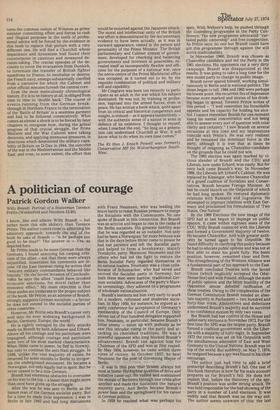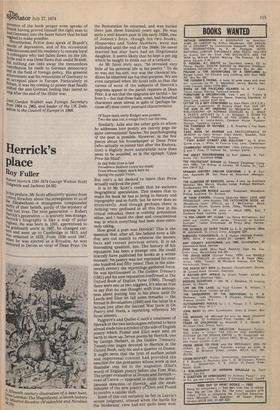A politician of courage
Patrick Gordon Walker
Willy Brandt: Portrait of a Statesman Terence Prittie (Weidenfeld and Nicolson £3.95) I know, like and admire Willy Brandt — but rather more this side idolatry than Terence Prittie. The author comes close to admitting his adulatory approach: towards the end of the book he asks of Brandt — "is he perhaps too good to be true?" The answer is — Yes, as depicted here. Mr Prittie tends to be more German than the Germans. I found annoying his carping criticism of the allies — not that these were always unjustified. Sometimes his comments are jejune. Of the East German rising he writes that "western military commandants behaved like tourists." On the Soviet invasion of Czechoslovakia he says the allies "could have invoked economic sanctions, for moral rather than economic effect." My. main objection is that these asides are irrelevant to the proper subject of the book. Mr Prittie, as an admirer of Brandt, strongly supports German socialism — a favour he does not extend to the socialist parties of other countries.
However, Mr Prittie sets Brandt's career very well into its ever widening background in Berlin, Germany, Europe, the world.
He is rightly outraged by the dirty attacks made on Brandt by both Adenauer and Erhard. Above all his courage and his patriotism were impugned, although courage and patriotism were two of his most marked characteristics. When Hitler came to power, he fled to Norway, but only to continue the anti-Nazi struggle. In 1936, unlike the vast majority of exiles, he returned for some months to Berlin to invigorate the underground movement. He became a Norwegian, not only legally but in spirit. But he never ceased to be a true German.
Brandt had enormous obstacles to overcome on his way to the top — a lesser man might more than once have given up the struggle. After the war he was sent to Berlin as the liaison man of the German socialist party. But for a time he made little impression. I was in Berlin in late 1945 and had .long discussions with Franz Neumann, who was leading the brave battle to resist Russian pressure to merge the Socialists with the Communists. No one spoke of Brandt in this connection. But Brandt was an activist and began to rise in the ranks of the Berlin socialists. His greatest liability was that he was regarded as an outsider. Not only had he been a Norwegian: far more heinous was that in the days before Hitler came to power he had lost patience and left the Socialist party and helped to form a breakaway, mainly Trotskyite, party. Moreover Neumann and the others who had led the fight to restore the Berlin Socialist Party regarded themselves as its natural leaders. Neumann was a close collaborator of Schumacher, who had saved and revived the Socialist party in Germany, but both these men were narrow, traditional German socialists. Advocates of the party's Marxist terminology, they adhered to 'a programme of wholesale nationalisation.
Brandt's instincts led him very early to work for a modern, reformed and moderate socialism. In May 1950, for instance, he argued at a party conference for acceptance of Germany's membership of the Council of Europe. Only eleven out of four hundred delegates supported him. Neumann, in particular, became Brandt's bitter enemy — eaten up with jealousy as he saw this intruder rising in the party and attacking its cherished traditions. He was a powerful opponent who long blocked Brandt's advancement. Brandt ran against him for Chairman of the SPD and was at first routed. By May 1954, however, he came within three votes of victory. In October 1957, he beat Neumann for the post of GOverning Mayor of Berlin.
It was in this pbat` that-Brandt always felt most at home. Flisdhigh@St qualities of drive and initiative came out. He rallied and maintained the morale of Berliners through one crisis after another.and made the Socialists the natural majority party. And Berlin became Brandt's power base and the springboard for his career in German politics.
In 1959 he reached what was perhaps his apex. With Wehner's help, he pushed through the Godesberg programme at the Party Conference. The new programme advocated "curtailed public ownership" and free competition. As Prittie says, no one but Brandt could have got this programme through against the still active traditionalists.
In November 1960, Brandt was chosen as Chancellor candidate and led the Party in the 1961 elections. His opponents ran a very dirty campaign. Brandt was disappointed at the results. It was going to take a long time for the new model party to change its public image.
Brandt never spared himself, working simultaneously in Berlin and in national politics. The strain began to tell. 1964 and 1965 were perhaps his lowest point. His recurrent fits of depression became more marked and stories of his drinking began to spread. Terence Prittie writes of this period — "I well remember his formidable appetite and his capacity for holding his alcohol. I cannot remember Brandt for one moment losing his mental concentration and not being able to answer every sort of question with total clarity and certainty." I saw Brandt on several occasions at this time and my impressions coincide with Prittie's. He was very resilient and he remained the dominant force in the party, although it is true that at times he thought of resigning as Chancellor-candidate on the grounds that he could not win.
The 1965 election was again marked by vicious slander of Brandt and the CDU and Liberals, now under Erhard, won easily. But for once luck came Brandt's way. In November 1966, the Liberals left Erhard's Cabinet, He was replaced by Kiesinger, who became Chancellor of a grand coalition of Socialists and Conservatives. Brandt became Foreign Minister. At last he could launch on the-Ostpolitik of which he had long spoken. He restored diplomatic relations with Rumania and Jugoslavia. He attempted to improve relations with East Germany and proclaimed his formulation of 'Two States, One Nation'.
By the 1969 Elections the new image of the SPD had at last begun to impinge on public opinion. It came within eighteen seats of the CDU. Willy Brandt coalesced with the Liberals and formed a Government majority of twelve. He became Chancellor. And with greater authority he turned agairr to his Ostpolitik. He found difficulty in clarifying this policy because he had to educate public opinion and was not at first able to state his goals fully. His basic position, however, remained clear and firm. The strengthening of the Western Alliance was a fundamental part of his approach to the East.
Brandt concluded Treaties with the Soviet Union (which implicitly accepted the OderNeisse line) and with Poland, although the state of public opinion and the bitter hostility of the Opposition almost defeated ratification of these treaties. Owing to the complexities of the German Constitution Brandt needed an absolute majority in Parliament — two hundred and forty-four votes. Abstentions and defections undermined Brandt's majority and he survived a no-confidence motion by only two votes. But Brandt had lost control of the House and called early elections in November 1972. For the first time the SPD was the largest party. Brandt formed a coalition government with the Liberals with a majority of forty-eight. In September 1973 the crown was set on his Ostpolitik with the simultaneous admission of East and West Germany to the United Nations. Brandt was on top of the world. But suddenly, on May 7, 1974, he resigned because a spy was found in his close entourage.
The author just had time to add a brief postscript describing Brandt's fall. One test of this book therefore is how far his main account prepares us for Brandt's fall. He does not explain that, before the discovery of the spy, Brandt's position was under strong attack. He was held responsible for the bad showing of the party in a number of Land elections. It was widely said that Brandt was on the way out. The author seems unaware of this: the last sentence of the book proper even speaks of ,Brandt having proved himself the right man to lead Germany into the fairer future that he had wkked to make possible. Nevertheless, Prittie does speak of Brandt's !floods of depression, and of his occasional Indecisiveness and his tendency to remain loyal to colleagues who had fallen down on the job. In the end it was these flaws that undid Brandt. But nothing can take away the tremendous contribution he made to German democracy and Ifl the field of foreign policy. His greatest achievement was his restoration of Germany to an. accepted place in Europe. Particularly in Britain, it was his coming to power that finally shifted the anti-German feeling that lasted so 1°rig after the end of the Hitler war.
Lord Gordon Walker was Foreign Secretary frcnri 1964 to 1965, and leader of the UK Delegation to the Council of Europe in 1966.




























 Previous page
Previous page